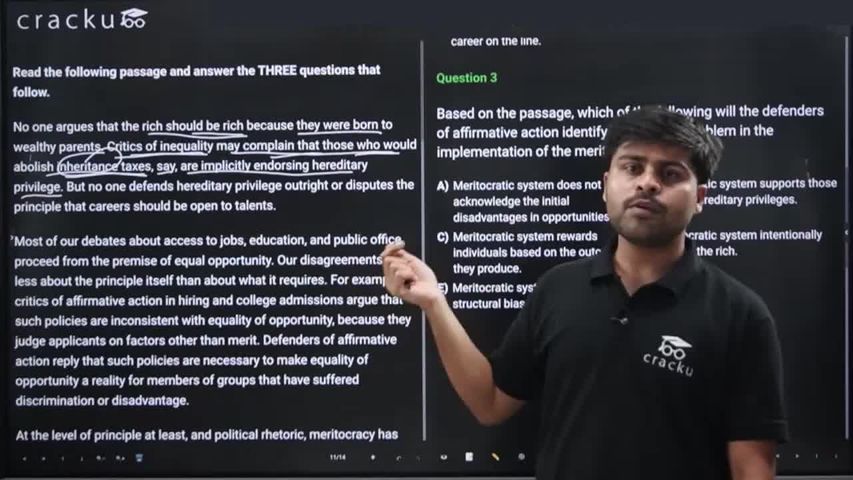Read the following passage and answer the THREE questions that follow.
No one argues that the rich should be rich because they were born to wealthy parents. Critics of inequality may complain that those who would abolish inheritance taxes, say, are implicitly endorsing hereditary privilege. But no one defends hereditary privilege outright or disputes the principle that careers should be open to talents.
Most of our debates about access to jobs, education, and public office proceed from the premise of equal opportunity. Our disagreements are less about the principle itself than about what it requires. For example, critics of affirmative action in hiring and college admissions argue that such policies are inconsistent with equality of opportunity, because they judge applicants on factors other than merit. Defenders of affirmative action reply that such policies are necessary to make equality of opportunity a reality for members of groups that have suffered discrimination or disadvantage.
At the level of principle at least, and political rhetoric, meritocracy has won the day. In democracies throughout the world, politicians of the center-left and center-right claim that their policies are the ones that will enable all citizens, whatever their race or ethnicity, gender or class, to compete on equal terms and to rise as far as their efforts and talents will take them. When people complain about meritocracy, the complaint is usually not about the ideal but about our failure to live up to it: The wealthy and powerful have rigged the system to perpetuate their privilege; the professional classes have figured out how to pass their advantages on to their children, converting the meritocracy into a hereditary aristocracy; colleges that claim to select students on merit give an edge to the sons and daughters of the wealthy and the well-connected. According to this complaint, meritocracy is a myth, a distant promise yet to be redeemed.
Solution
Among the given choices, Option B offers an apt summary of the author’s intended message. The passage critiques the implementation of meritocracy in unequal societies. While meritocracy is upheld as an ideal, the passage underscores that in practice, structural inequalities - such as the wealthy rigging the system and passing privileges to their children - subvert its execution. The very institutions that claim to promote meritocracy (e.g., colleges) often end up perpetuating inequality by giving advantages to the wealthy and well-connected. This implies that any attempt to establish meritocracy in an unequal society is compromised by existing disparities, thus perpetuating inequality rather than eliminating it.
Contrarily, the remaining choices are either not implied or stated in the passage. For instance, while the passage critiques the wealthy's manipulation, it does not frame meritocracy as inherently “utopian,” as suggested in Option A. The emphasis is on practical shortcomings, not on it being an unattainable ideal. Option D also distorts the message: the passage shows that people understand meritocracy well but disagree on its practical implementation; the critique focuses on execution, not comprehension.
Option E is out of scope: the passage does not delve into selfish motivations for rejecting meritocracy. Similarly, Option C is not understood from the passage: the author focuses on systemic critiques rather than individual resentment. Critics argue meritocracy has failed to deliver fairness due to structural flaws, not because they are personally “rejected.”
Video Solution

Click on the Email ☝️ to Watch the Video Solution
Create a FREE account and get:
- All Quant Formulas and shortcuts PDF
- 15 XAT previous papers with solutions PDF
- XAT Trial Classes for FREE
